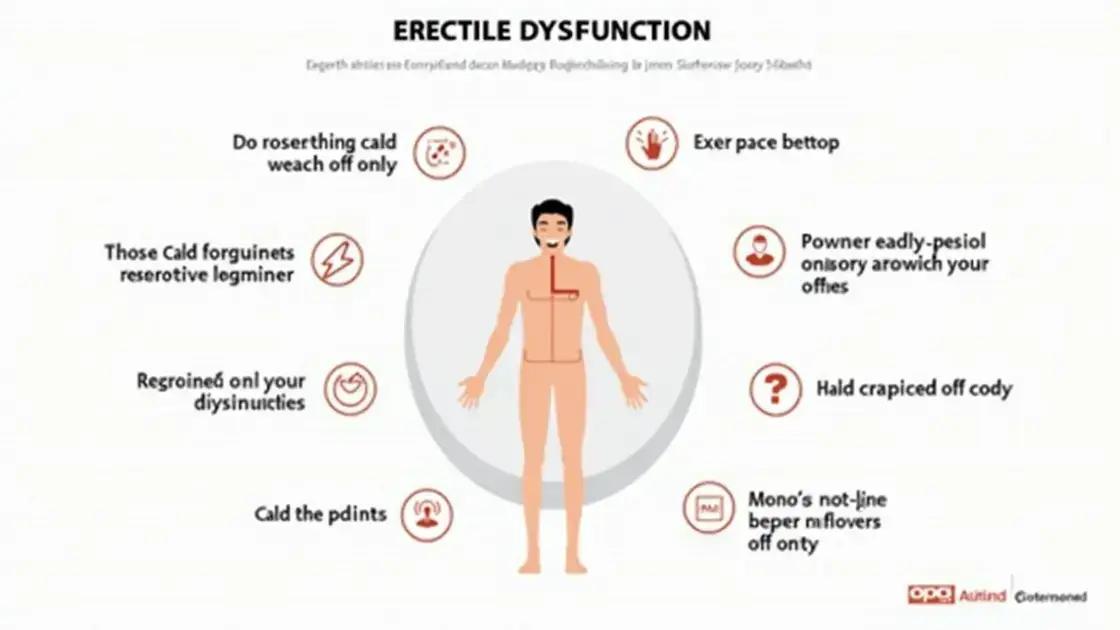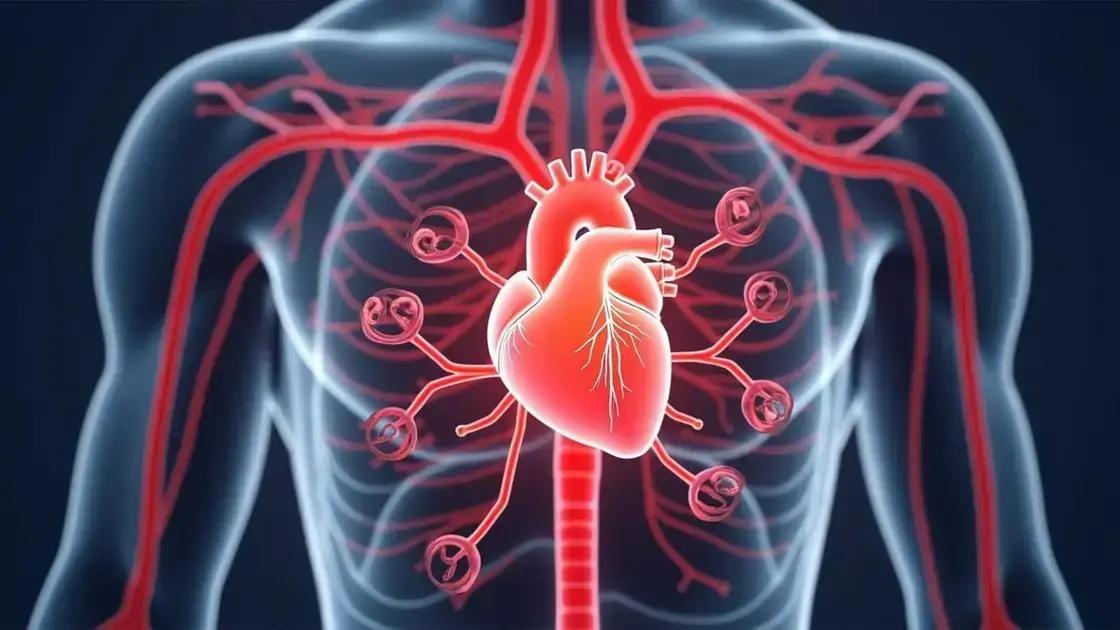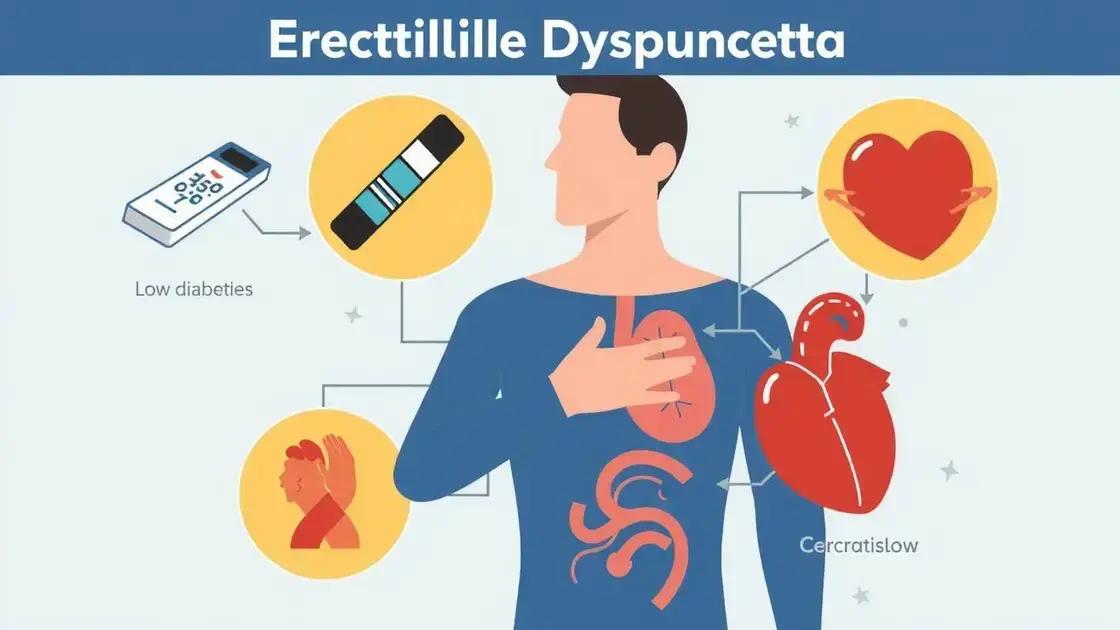Erectile dysfunction (ED) can be an early warning sign of serious health risks, including heart disease and diabetes. Understanding the link between ED and overall health, recognizing when to seek medical attention, and adopting preventative measures like a healthy lifestyle are crucial for men’s well-being.
Erectile dysfunction (ED) can be more than just an occasional hurdle for men; it may signify underlying health issues. This condition often serves as a vital indicator of larger problems, connecting to cardiovascular health, diabetes, and more. In this article, we will explore how erectile dysfunction may predict future health risks, the significant intersections between ED and other serious medical conditions, and what men should consider about their sexual health and overall wellness.
Understanding Erectile Dysfunction

Erectile dysfunction (ED) is a common condition that affects many men at different stages of life. It refers to the inability to achieve or maintain an erection suitable for sexual intercourse. This issue can stem from various physical and psychological factors, including stress, anxiety, diabetes, and heart disease.
Common Causes of Erectile Dysfunction
Physical Factors: Many medical conditions can lead to ED. For example, heart disease, high blood pressure, and obesity are significant contributors. These conditions can restrict blood flow, making it difficult to achieve an erection.
Psychological Factors: Mental health also plays a crucial role in erectile dysfunction. Anxiety, depression, and stress can negatively affect a man’s ability to engage sexually. Often, the emotional struggle may exacerbate the problem, creating a vicious cycle.
Diagnosis of Erectile Dysfunction
To diagnose ED, healthcare professionals may conduct a physical exam and review the patient’s medical history. Laboratory tests may be necessary to determine underlying health issues, such as diabetes or hormonal imbalances.
Treatments for Erectile Dysfunction
Treatment options vary based on the cause of ED. Medications like phosphodiesterase type 5 inhibitors may be prescribed. Additionally, lifestyle changes, such as increased exercise, maintaining a healthy weight, and quitting smoking, can dramatically improve erectile function.
Understanding erectile dysfunction is critical, as it can indicate more severe health risks. Early detection and appropriate treatment of ED may enhance overall well-being and prevent significant future health issues.
The Link Between ED and Heart Health

The connection between erectile dysfunction (ED) and heart health is significant. Studies have shown that men with ED often face a higher risk of cardiovascular problems. This is because the same factors that affect blood flow to the penis can also impact the heart.
Common Risk Factors
Cholesterol Levels: High cholesterol can lead to plaque buildup in the arteries, reducing blood flow. This can cause both ED and heart disease.
Hypertension: High blood pressure can damage blood vessels, making it harder for blood to flow to the penis, contributing to the occurrence of ED.
How Heart Health Affects ED
The heart and the penis rely on proper blood circulation. When blood vessels are narrow or damaged due to heart conditions, it becomes difficult to achieve or maintain an erection. Understanding this link is essential for overall health.
Preventive Measures for Heart Health
Men can protect their heart and erectile function by adopting a healthier lifestyle. Regular exercise, a balanced diet, and avoiding smoking can lower the risk of both ED and heart disease. It’s important to manage stress levels and get regular medical check-ups.
Consulting Healthcare Providers
Recognizing the interplay between ED and heart health allows men to discuss their symptoms with healthcare providers openly. Proper treatment for one condition may improve the other, creating a pathway to better overall health.
ED as a Warning Sign for Other Conditions

Erectile dysfunction (ED) can often signal other serious health conditions. Many men may not realize that ED can be an early warning sign of issues lurking beneath the surface, such as hormonal imbalances, diabetes, and even certain types of cancer.
Diabetes and ED
One of the most common conditions related to erectile dysfunction is diabetes. High blood sugar levels can damage blood vessels and nerves, making it difficult to achieve or maintain an erection. Men diagnosed with diabetes should be aware of this potential complication.
Hormonal Imbalances
Low Testosterone: Low levels of testosterone, a hormone crucial for male sexual function, can lead to reduced libido and erectile dysfunction. Hormonal tests can help determine if this is a factor.
Cardiovascular Disease
As previously mentioned, the health of the heart plays a significant role in erectile function. Men with ED may unknowingly be facing cardiovascular issues, such as atherosclerosis, which narrows arteries and affects blood flow.
Psychological Factors
In some cases, psychological conditions like depression and anxiety can manifest as erectile dysfunction. Recognizing ED as a symptom of a broader psychological issue is essential for effective treatment.
Understanding that erectile dysfunction is a warning sign for various health conditions allows men to seek timely medical advice. The earlier they address these issues, the better their chances are for improving their overall health.
Preventative Measures for Men’s Health

Men’s health is crucial, and adopting preventative measures can significantly reduce the risk of erectile dysfunction (ED) and other health issues. Here are some key practices to promote better health.
Regular Exercise
Engaging in physical activity for at least 30 minutes a day can improve blood circulation, reduce stress, and maintain a healthy weight. Activities like walking, jogging, and swimming can help keep you fit.
Healthy Eating Habits
A balanced diet rich in fruits, vegetables, whole grains, and lean proteins can boost overall health. Foods high in antioxidants, like berries, may improve blood flow and sexual function.
Avoiding Smoking and Limiting Alcohol
Smoking restricts blood flow and contributes to ED. Quitting smoking can lead to significant health improvements. Limiting alcohol consumption is also vital, as excessive drinking can lead to erectile dysfunction.
Regular Health Check-ups
Visiting your healthcare provider regularly can help catch and manage potential health issues early. This includes monitoring blood pressure, cholesterol levels, and blood sugar levels.
Managing Stress and Mental Health
Stress management through relaxation techniques, such as meditation or yoga, can be beneficial. Seeking help for mental health issues like anxiety or depression is also important, as these can significantly affect sexual performance.
By incorporating these preventative measures into daily life, men can improve their overall health and reduce the risk of erectile dysfunction and other related health issues.
When to See a Doctor for ED Concerns

Recognizing when to see a doctor for erectile dysfunction (ED) can make a significant difference in addressing potential health issues. It is vital for men to understand the signs that warrant professional consultation.
Persistent ED Symptoms
If erectile dysfunction occurs frequently and persists over time, it is advisable to seek medical advice. Occasional difficulties may not be a cause for concern, but ongoing problems should not be ignored.
Accompanied Health Issues
Men experiencing ED along with other symptoms, such as pain during intercourse or changes in libido, should consult a doctor. These may indicate underlying health conditions requiring attention.
Signs of Serious Conditions
If ED is coupled with symptoms like chest pain, shortness of breath, or significant changes in overall health, immediate medical advice is necessary. These symptoms could signal serious cardiovascular issues.
Psychological Concerns
Men feeling excessive anxiety, depression, or stress linked to ED should seek help from a mental health professional. Addressing these psychological factors is crucial for effective treatment.
Before Starting New Treatments
Consulting a doctor before initiating any treatments or medications for ED is essential. Some medications may interact with existing health issues or other medications, so professional guidance can help ensure safety.
Understanding when to see a doctor regarding ED concerns empowers men to take charge of their health and well-being, leading to appropriate interventions and better outcomes.
Understanding the Importance of ED Awareness
Erectile dysfunction is more than just a personal issue; it can be a vital indicator of a man’s overall health. Recognizing the signs and symptoms of ED allows men to take proactive steps towards their health.
By understanding the connection between ED and other serious health risks, such as heart disease and diabetes, men can seek early intervention and treatment. Adopting preventative measures can significantly improve both sexual health and quality of life.
It is essential for men to stay informed about their health and consult a healthcare provider when experiencing persistent ED symptoms or related concerns. Early detection can lead to better management of health conditions and overall well-being.
In conclusion, erectile dysfunction should not be viewed in isolation; rather, it is intricately linked to other health issues. Awareness and action are key to maintaining good health.
FAQ – Frequently Asked Questions about Erectile Dysfunction and Men’s Health
What is erectile dysfunction (ED)?
Erectile dysfunction is the inability to achieve or maintain an erection suitable for sexual intercourse. It can be caused by various physical and psychological factors.
Can erectile dysfunction predict future health risks?
Yes, erectile dysfunction can be a warning sign for underlying health issues, including heart disease and diabetes, indicating the need for medical evaluation.
When should I see a doctor for ED concerns?
You should consult a doctor if you experience persistent ED symptoms, have concerns about your sexual health, or if ED is accompanied by other health issues.
What preventative measures can I take to improve men’s health?
Regular exercise, a balanced diet, avoiding smoking and excessive alcohol, managing stress, and having regular health check-ups are essential for promoting men’s health.
How does heart health relate to erectile dysfunction?
Many factors affecting heart health, such as blood flow and cholesterol levels, can also impact erectile function. ED may indicate potential heart issues.
Can psychological factors contribute to ED?
Yes, conditions like anxiety and depression can significantly affect sexual performance. Addressing these issues is important for treating erectile dysfunction.













